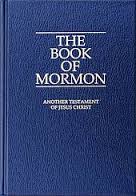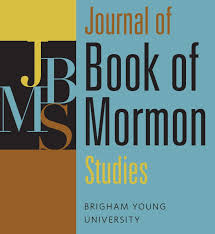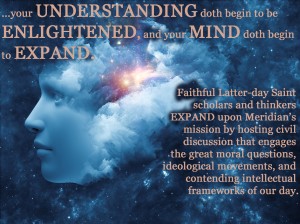 Here are some excerpts from a 6700-word essay to appear shortly at Meridian/Expand: “To Whom Shall We Go? From Apologetics to Mormon Studies” All those whose views are discussed will be invited to respond — along with any other reasonable and civil interlocutors.
Here are some excerpts from a 6700-word essay to appear shortly at Meridian/Expand: “To Whom Shall We Go? From Apologetics to Mormon Studies” All those whose views are discussed will be invited to respond — along with any other reasonable and civil interlocutors.
What reasonable voices agree on is this: there is room in the study of Mormon things for both (1) scholarship that presupposes and often defends Mormon exceptionalism, that is, scholarship that openly assents to the peculiar truth claims of the Latter-day Saints and often provides “apologetics” on behalf of those claims; and (2) scholarship that “brackets” or sets aside or is simply silent about such claims, in order to engage a “broader” audience uninterested in such claims and in fact liable to be put off by them. In a word, and to use a short-hand that risks being emotionally charged but whose convenience cannot be denied: there are those LDS scholars who mainly practice “apologetic” scholarship, and those who mainly practice “mainstream academic” scholarship, and reasonable people of each type recognizes the legitimacy of the other. Since the names are familiar to anyone who knows what I am talking about, let them be named: on the one hand, Daniel Peterson, who has raised critical questions about Benjamin Park’s review, agrees that a “Mormon Studies” that engages non-Mormon, even “secular” scholarship on Mormon things can be good for Mormon; while, on the other, Terryl Givens and David Holland, who have defended Park’s goals, though not necessarily his phrasing, agree (unlike some voices at the new Maxwell Institute) that “Mormon Apologetics” is a useful and intellectually respectable enterprise.
…I do not at all object to the suggestion that there can be narrowness in an intra-Mormon discussion, or even in a discussion that focusses somewhat narrowly on certain distinctive Mormon claims. We can all benefit from engaging unaccustomed conversations. My question is, rather, like Peter’s: to whom then shall we go? What interlocutors should we seek in trying to expand our minds to more fully appreciate, as Ben says, “the Book’s power and promise?” Benjamin Park’s answer to Mormon narrowness is a turn towards a majority or critical mass of a certain group of historians, a group that is interested in “history” as opposed to Mormonism or even religion in general. Why exactly the conversation with historians uninterested in religion ought to be considered a “broader scholarly conversation” than that involving people, including Mormons, interested in truths that might guide our lives, even change our lives, is far from obvious.
…In his interest in a universal human seeking David Holland’s perspective points to a breadth beyond the widening circles of contextualization that form Ben Park’s vistas. And a philosopher can certainly appreciate this interest in the inexhaustible forms of the human search for the divine, for whatever answers we think we already possess can be fully appreciated — even, arguably, really understood — and ever-renewed, only in the light of our continued exploration of the fundamental human questions. This suggests a breadth of horizon for “Mormon Studies” that goes well beyond contextualization in the American 19th or any other century….
…If anyone doubted the possibility of expanding the study of Mormonism and of the Book of Mormon in particular in such a way as to reach the “non-religious” without denying the distinctive truth-claims of Mormonism, then we have the splendid example of Terryl Givens himself to assuage any doubts. Brother Givens has stretched our minds and at the same time enlarged our souls with his studies of the meaning of Mormonism within the broadest spiritual and intellectual contexts. And I am inclined to agree with his judgment that, in a way, to coin a phrase, “any publicity is good publicity” where the Book of Mormon is concerned. I, like Terryl, am in favor of a strategy that increases “sustained exposure” to this remarkable text, whether by focusing on “19th century historical context” or by other such scholarly gambits. I mean only to point out that there can be some cost to making the text “more relevant” to a general scholarly community, because “relevance” always appears in a context of priorities and assumptions. …
The appeal to the ultimacy of History is inseparable, finally, from a certain secular humanism. The phrase, I know, is loaded, but the argument is not complicated: if there is no truth above History, then, short of a serious appeal to Providence or to some Hegelian argument for History as the unfolding of a divine Absolute (an argument that only makes sense from the standpoint of the End of History), then to explain religion finally in terms of historical context is to explain it as a variable and at bottom accidental human construction. The implications of such a secular academic faith are apparent in Stephen Taysom’s call for a new “maturity in Mormon Studies.” …
….. Elder Maxwell himself clearly saw this coming: “This new irreligious imperialism,” he wrote, “seeks to disallow certain opinions simply because those opinions grow out of religious convictions. Resistance to abortion will be seen as primitive. Concern over the institution of the family will be viewed as untrendy and unenlightened.”
…Historical contextualizing can be interesting and even relevant to the soul’s edification, but it must not overshadow our deep human interest in a saving and redeeming Truth beyond historical construction….
…Apologists and Truth-seekers must be friends, and they must invite mere contextualizing scholars to join them, but on the higher ground of the pursuit of Truth.











